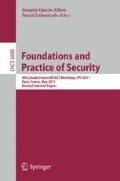Abstract
The Hierarchical Optimized Link State Routing (HOLSR) protocol enhances the scalability and heterogeneity of traditional OLSR-based Mobile Ad-Hoc Networks (MANETs). It organizes the network in logical levels and nodes in clusters. In every cluster, it implements the mechanisms and algorithms of the original OLSR to generate and to distribute control traffic information. However, the HOLSR protocol was designed with no security in mind. Indeed, it both inherits, from OLSR, and adds new security threats. For instance, the existence of misbehaving nodes can highly affect important HOLSR operations, such as the cluster formation. Cluster IDentification (CID) messages are implemented to organize a HOLSR network in clusters. In every message, the hop count field indicates to the receiver the distance in hops to the originator. An attacker may maliciously alter the hop count field. As a consequence, a receiver node may join a cluster head farther away than it appears. Then, the scalability properties in a HOLSR network is affected by an unbalanced distribution of nodes per cluster. We present a solution based on the use of hash chains to protect mutable fields in CID messages. As a consequence, when a misbehaving node alters the hop count field in a CID message, the receiver nodes are able of detecting and discarding the invalid message.
Access this chapter
Tax calculation will be finalised at checkout
Purchases are for personal use only
Preview
Unable to display preview. Download preview PDF.
References
Arce, P., Guerri, J.C., Pajares, A., Lázaro, O.: Performance evaluation of video streaming over ad hoc networks using flat and hierarchical routing protocols. Mobile Networks and Applications 13(3-4), 324–336 (2008)
Baccelli, E.: OLSR scaling with hierarchical routing and dynamic tree clustering. In: IASTED International Conference on Networks and Communication Systems (NCS), Chiang Mai, Thailand (March 2006)
Baccelli, E.: OLSR Trees: A Simple Clustering Mechanism for OLSR. In: Al Agha, K., Guérin Lassous, I., Pujolle, G. (eds.) Challenges in Ad Hoc Networking. IFIP, vol. 197, pp. 265–274. Springer, Boston (2006)
Clausen, T., Jacquet, P.: Optimized link state routing protocol (OLSR), RFC3626. IETF Internet Draft (October 2003), http://www.ietf.org/rfc/rfc3626.txt
Henderson, T., et al.: The NS-3 network simulator (2011) Software package retrieved from, http://www.nsnam.org/
Hong, F., Hong, L., Fu, C.: Secure OLSR. In: International Conference on Advanced Information Networking and Applications, vol. 1, pp. 713–718 (2005)
Hu, Y.-C., Johnson, D.B., Perrig, A.: Sead: secure efficient distance vector routing for mobile wireless ad hoc networks. Ad Hoc Networks 1(1), 175–192 (2003)
Jacquet, P., Muhlethaler, P., Clausen, T., Laouiti, A., Qayyum, A., Viennot, L.: Optimized link state routing protocol for ad hoc networks. In: Proceedings of IEEE International Multi Topic Conference, IEEE INMIC 2001. Technology for the 21st Century, pp. 62–68. Lahore University of Management Sciences, Pakistan (2001)
Kush, A., Hwang, C.: Proposed protocol for hash-secured routing in ad hoc networks. Masaum Journal of Computing (MJC) 1, 221–226 (2009) ISSN 2076-0833
Lamport, L.: Password authentication with insecure communication. Commun. ACM 24, 770–772 (1981)
Palma, D., Curado, M.: Inside-Out OLSR Scalability Analysis. In: Ruiz, P.M., Garcia-Luna-Aceves, J.J. (eds.) ADHOC-NOW 2009. LNCS, vol. 5793, pp. 354–359. Springer, Heidelberg (2009)
Ros, F.J., Ruiz, P.M.: Cluster-based OLSR extensions to reduce control overhead in mobile ad hoc networks. In: Proceedings of the 2007 International Conference on Wireless Communications and Mobile Computing, pp. 202–207. ACM (2007)
Stallings, W.: Cryptography and Network Security, Principles and Practices. Pearson Prentice Hall (2006)
Villasenor-Gonzalez, L., Ge, Y., Lamont, L.: HOLSR: A hierarchical proactive routing mechanism for mobile ad hoc networks. IEEE Communications Magazine 43(7), 118–125 (2005)
Voorhaen, M., Van de Velde, E., Blondia, C.: MORHE: A Transparent Multi-Level Routing Scheme for Ad Hoc Networks. In: Al Agha, K., Guérin Lassous, I., Pujolle, G. (eds.) Challenges in Ad Hoc Networking. IFIP, vol. 197, pp. 139–148. Springer, Boston (2006)
Author information
Authors and Affiliations
Editor information
Editors and Affiliations
Rights and permissions
Copyright information
© 2012 Springer-Verlag Berlin Heidelberg
About this paper
Cite this paper
Cervera, G., Barbeau, M., Garcia-Alfaro, J., Kranakis, E. (2012). Preventing the Cluster Formation Attack against the Hierarchical OLSR Protocol. In: Garcia-Alfaro, J., Lafourcade, P. (eds) Foundations and Practice of Security. FPS 2011. Lecture Notes in Computer Science, vol 6888. Springer, Berlin, Heidelberg. https://doi.org/10.1007/978-3-642-27901-0_10
Download citation
DOI: https://doi.org/10.1007/978-3-642-27901-0_10
Publisher Name: Springer, Berlin, Heidelberg
Print ISBN: 978-3-642-27900-3
Online ISBN: 978-3-642-27901-0
eBook Packages: Computer ScienceComputer Science (R0)

